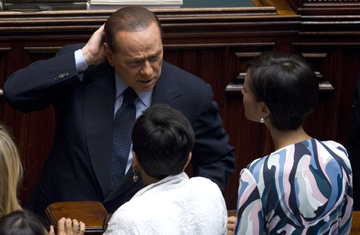
Italian Prime Minister Silvio Berlusconi gestures as he talks in the lower house of Parliament during a confidence vote in Rome on Friday, July 15, 2011
It wasn't a burst of negative financial news that threatened to tip Italy toward economic catastrophe this week. Instead, it was something that in less fraught times would have been seen as politics as usual: the escalation of a feud between Prime Minister Silvio Berlusconi and a member of his government.
The trouble was that the man Berlusconi was criticizing is Italy's Finance Minister, Giulio Tremonti, a former law professor many believe has been instrumental in keeping Italy from following in the footsteps of crisis-ridden Greece, Portugal and Ireland. So when Berlusconi told the Italian daily La Repubblica in an interview published July 8 that Tremonti is "the only Minister who is not a team player" and that "he thinks he's a genius and everyone else is stupid," the markets reacted.
On July 8, the spread on Italian bonds rose to their highest levels in nearly a decade. The Milan stock market followed, tumbling nearly 4% on Monday, July 11, before slowly recovering when Italian politicians rushed to reassure investors that Italy would quickly pass a long-awaited and much debated €50 billion ($70 billion) austerity package. "Politics is back in town," says Franco Pavoncello, a political scientist at Rome's John Cabot University. For a period after the introduction of the euro, investors didn't seem to care about the performance of individual governments. No matter how flaky or unstable they appeared to be, there was the perception that the European Union stood behind them. No longer. "Once again you need to produce governments that are going to reassure markets," says Pavoncello. "Otherwise the markets are going to collapse."
To be sure, with public debt levels at 120% of GDP and an economy many see as too big to be bailed out, Italy's finances need careful handling. But recently the government has been far from able to reassure the markets. After a long year in which Berlusconi split with a long-term ally and then was brought to court on charges in a juvenile-prostitution scandal, the Prime Minister's party was defeated in regional elections and routed in a referendum that was widely seen as a condemnation of its policies. Since then, even as Italy's European neighbors edge toward the brink, Berlusconi and his allies have seemed more interested in watering down reforms than in making changes that would protect Italy from collapse. Indeed, in his comments to La Repubblica, Berlusconi said he would alter the austerity package before it went to a vote to make it less focused on appeasing the markets and friendlier to the voters.
But then last week's near meltdown moved the austerity package to center stage, and the government rushed to push it through, with little time for further debate. "We agreed on these spending cuts because the house is burning and we have to put water on the fire," says Marco Perduca, a Senator for the small opposition Radical Party. "But we had to discuss the [austerity package] in a matter of minutes. Does this kind of thing happen in a democratic country?" On Thursday, July 14, the measure passed the Senate. And on Friday, the lower chamber gave its stamp of approval in record time. "Faced with the abyss, everybody had to roll up their sleeves," says Pavoncello. "But the issue is that until then, nobody had the guts to do it."
Berlusconi, who has said he will not seek another term when his current one expires in 2013, has been so weakened politically that he needs to cling to every last member of his wavering coalition. This makes it hard to make the difficult choices investors believe the country needs to make if it is going to get its debt under control. But more important, what Italy needs isn't just austerity; it's growth. And for that, it needs liberalization of the market. One sign of just how tough the government finds it to institute changes is the fate of an effort to liberalize Italy's system of guilds for lawyers, accountants and notaries public. In the months leading up to the austerity vote, measures that would make simple changes to help open up Italy's closed professions, such as allowing advertising or lowering minimum tariffs, were repeatedly inserted into and removed from the legislation.
Last week, as the changes seemed ready to go forward, 22 parliamentarians from Berlusconi's party — all of whom are also lawyers — sent a letter to the Senate saying they would walk if the measure was left in, even if it meant bringing down the government. "This signals how weak our politicians are against the lobbies that are fiercely against even mild attempts at reforms," says Michele Pellizzari, a labor economist at Milan's Bocconi University. Given the fact that most of the new austerity package's cuts aren't scheduled to go into effect until after elections in 2013, the previous failure to implement basic changes sends a worrying signal about the future government's ability to deliver. "Anything that makes this commitment [to austerity] seem less credible is extremely dangerous for Italy right now," say Pellizzari. The markets — and Italy's voters — will be watching Berlusconi and his coalition very carefully.
